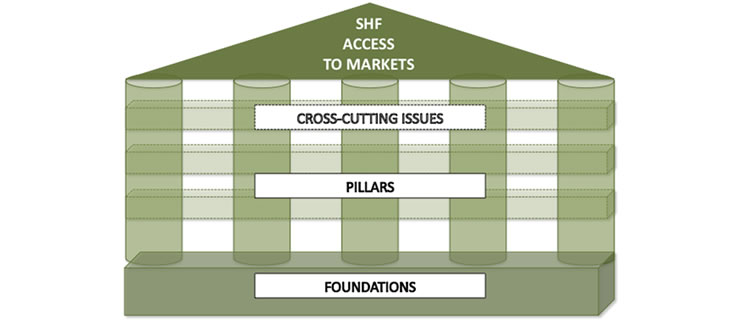The policy support framework
a. Some general observations
13. The intention with this framework is to provide an evidence-backed description of a set of laws, regulations, policies and practices that will promote and enable investment from smallholder farmers and others along the agricultural value chain; and to help scale up their participation in markets.
14. Case studies confirm that once obstacles are removed, farmers will self-mobilise to increase their productivity and participate more actively in available markets. Government’s role should ideally be restricted to removing obstacles, promoting and enabling investment and protecting farmers’ interests. For example, the Future Agricultures Consortium’s recently-completed case studies in Ethiopia, Ghana, Kenya, Malawi and Tanzania[1] on successful commercialisation by smallholder farmers found little evidence of outside intervention or stimulus: given supportive circumstances (in this case, government-provided irrigation infrastructure was a particularly significant factor), farmers took the initiative and created their own opportunities to commercialise.
15. A number of general principles are worth bearing in mind in using this framework:[2]
- No one approach will fit all – social, political and economic context is all-important. The framework can, at best, be a guide.
- Policies do not work in isolation; a holistic approach is essential.
- It is crucial to monitor the impact of policies on an ongoing basis. How best to support smallholder farmers in the context of a dynamic and rapidly evolving global environment is still an area of great uncertainty and many mistakes are likely to be made. Instead of persisting with policies that are not working, governments and other stakeholders should be encouraged to respond swiftly to change, learn from mistakes and adapt.
- Not everything needs to be perfect for policy to work; even small improvements in the fundamentals can deliver positive results.
- An incremental approach can deliver better outcomes than radical interventions or large-scale change.
- Finally, getting policy right is only the first step. Implementation is key.
b. Framework design
16. There is, of course, no single set of policies that will improve smallholder farmers’ prospects in every African country and under all circumstances. However, a number of conditions repeatedly show up in the literature as being material in the majority of cases where smallholder farmers have raised their output and incomes and participated in agricultural growth (Wiggins 2011). For purposes of this framework these have been arranged into
- foundations, which potentially benefit the entire rural population, including smallholder farmers;
- pillars, which specifically support smallholder farmers; and
- cross-cutting issues, which have wider relevance beyond the rural economy.

[1] Research shared by S Wiggins at Future Agricultures Consortium seminar at ODI, London on 23 February 2013 (not yet published).
[2] Drawn from Wiggins (2012), Vorley et al (2012), ThisisAfrica (2012), and research shared by S Wiggins at Future Agricultures Consortium seminar at ODI, London on 23 February 2013.